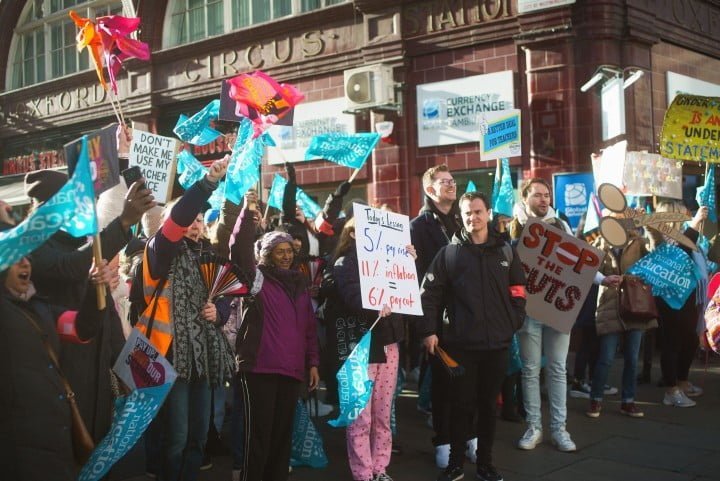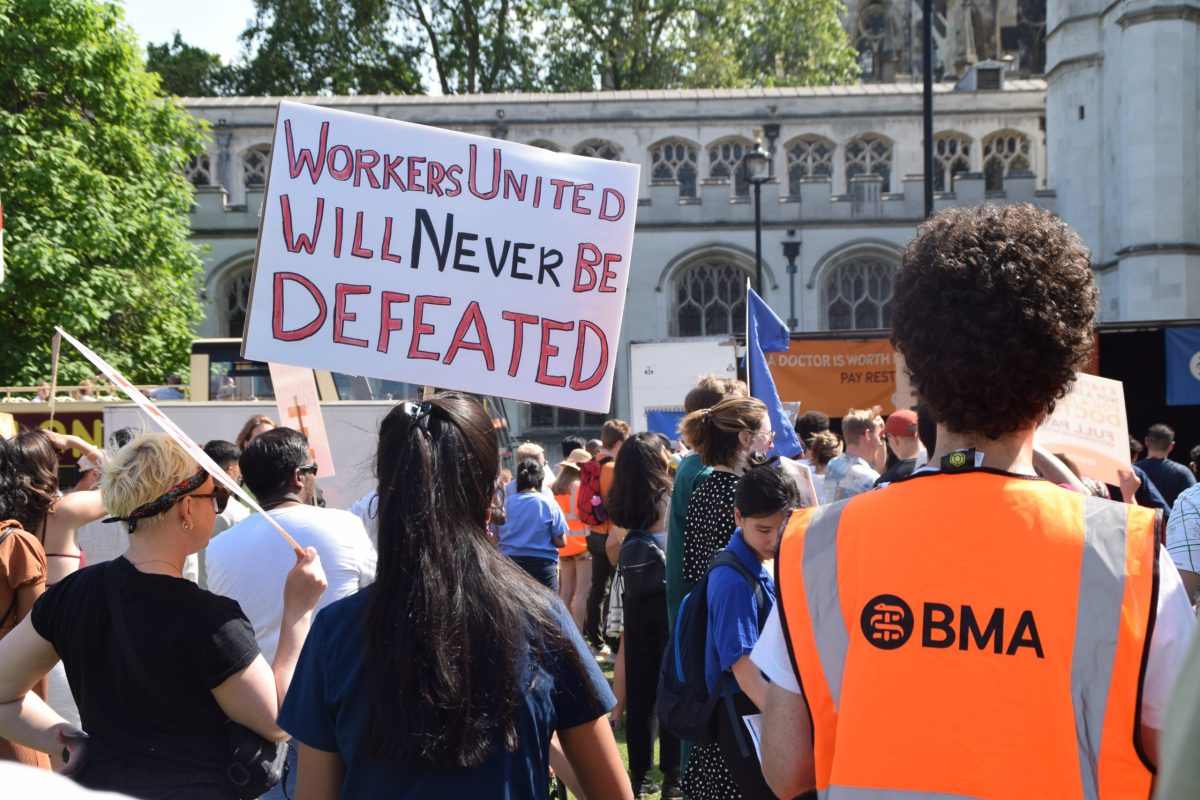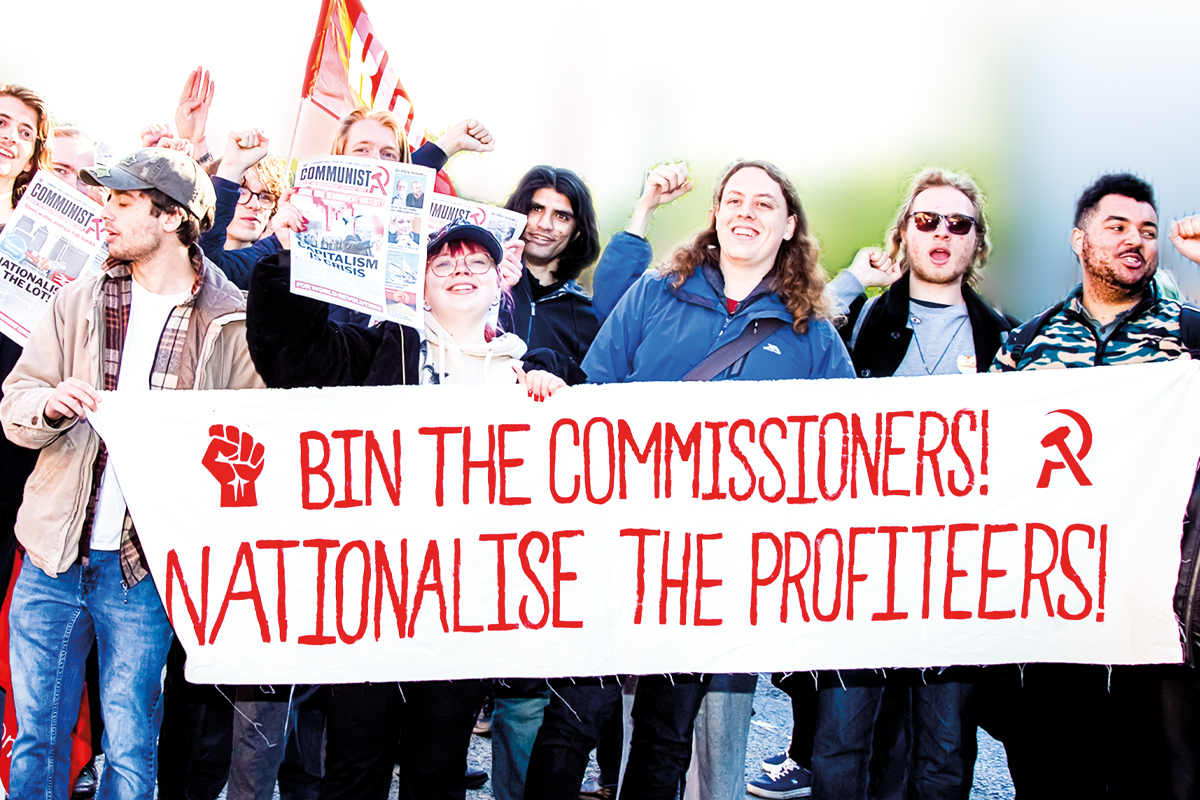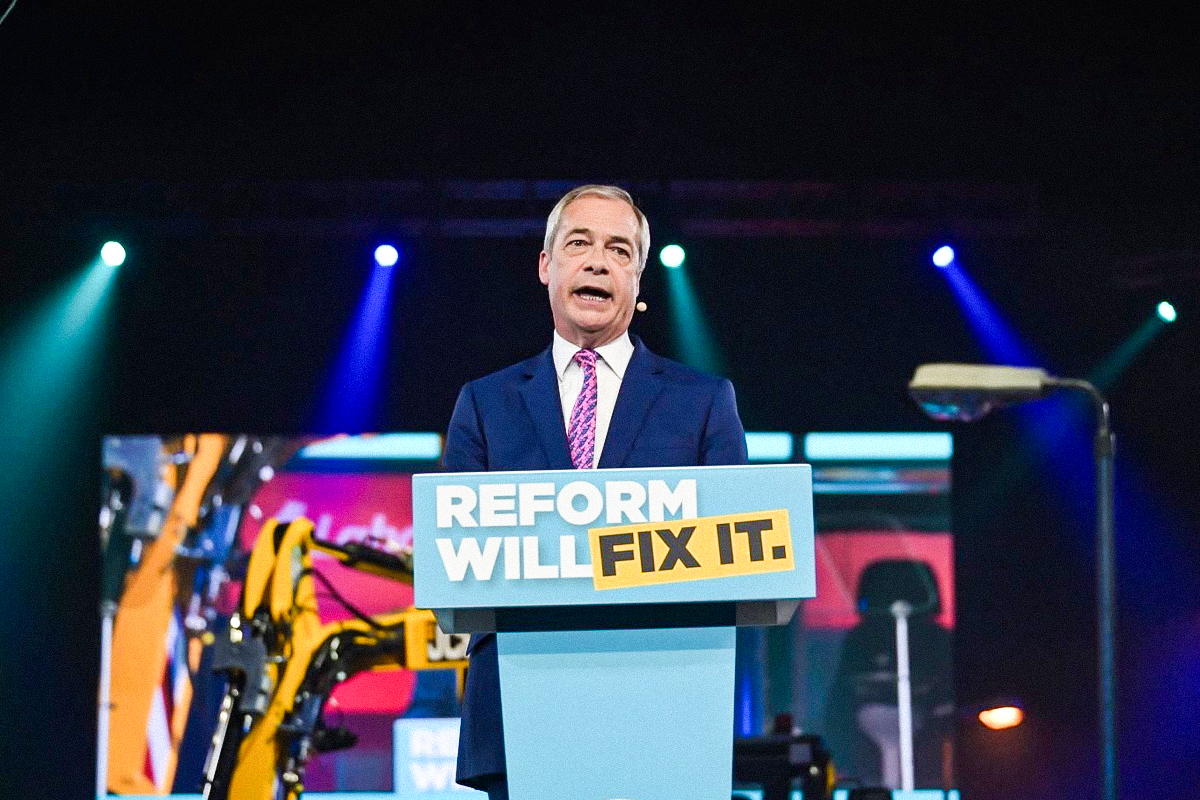There are rumblings in the trade unions. Beneath the surface, anger is rising and a struggle is being prepared.
According to the TUC, since 2008, real weekly wages have shrunk on average by 0.2 percent per year. This is the longest pay squeeze for workers for 200 years, since Napoleonic times. For millions of workers, it’s not just stagnation – they’re worse off than 17 years ago.
For 14 years the trade union leaders blamed the Tories. “Just hold on for a Labour government,” was the message.
But now a Labour government is here – and nothing has changed. That’s because Starmer’s government, like the Tories, are servants of the capitalist class. They demand profits at the expense of workers’ living standards.
Last year, after the election, Starmer offered some workers small pay rises. It wasn’t enough, but at least it was something.
This year, while the government spends billions on bombs, it’s offering scraps to workers.
Union members are getting angry. They’re putting pressure on their leaders. Class battles are on the horizon.
Education
That much was evident at the UCU congress last month (see report below). Delegates voted to take the fight straight to the Labour government.
This vote overcame hesitancy from the union’s leadership, and even the ‘official left’. The ranks of the union are moving to the left faster than their leaders.
Meanwhile, the UCU is planning an autumn strike ballot for further education colleges.
At the same time, the NEU conference demanded strike action if the government’s pay offer is not improved. The NEU leaders aren’t particularly keen to take up the fight, but ordinary teachers are furious.

There’s been some talk of the teaching unions coordinating action across universities, colleges, and schools. That’s the right approach. But for this to be successful, we need serious fighting leadership in these unions.
In that context, the decision of the NASUWT to appoint Matt Wrack to be its new general secretary is a bold move.
This is the less militant teachers’ union. But it has chosen a left-wing former FBU chief to lead it.
The details of that decision are a bit unclear. But it’s hard to read this as anything other than a signal of intent.
The right-wing elements of NASUWT have kicked up a fuss and forced a new ballot. How the membership votes will be a sign of the mood among teachers.
Civil servants
PCS conference delegates, meanwhile, have backed a campaign for an £18-per-hour minimum wage. They want to ballot for strike action by mid-September if progress isn’t made to meet their demands.
Labour is meeting with union representatives more than the Tories did. But it’s not actually making any difference.
“They can meet us as much as they like,” said the PCS general secretary, “but if at the same time they’re then making announcements attacking our members or announcing large-scale cuts, then that’s not so helpful.”
This government is more than “unhelpful” to workers. It’s determined to cut wages and conditions. We need to be equally determined in striking back. And we need leaders with resolve to take up the fight.
Healthcare and public sector
Keir Starmer and Wes Streeting have enraged NHS workers with insultingly low pay offers.
The BMA leadership has begun a ballot for strike action. If successful, this could mean walkouts from July.

Following the example of the Birmingham bin strikers, this is the fighting spirit we need.
At the same time, consultant (senior) doctors are also considering action over a measly four percent pay offer.
Most scandalous is the offer of 3.6 percent to nurses. The leadership of the Royal College of Nursing described this as “grotesque”. You can imagine the anger among ordinary members.
Elections are underway in Unison, the biggest union in the country. In a sign of weakness, the right-wing bureaucracy has been purging the left. But beneath this factionalising, the mood is growing more militant.
In Scotland, Unison care workers are staging the first national walkout in over a decade. And members in local government are balloting for strike action at all 32 of Scotland’s councils.
Militancy
The militancy of the Birmingham bin strike is exemplary. The mood on the picket lines has been effervescent.

The strikers are determined, and they’ve forced their Unite leaders to come out fighting against the government on their behalf. This shows what resolve and a clear plan achieves.
This is the example we should look to across the entire trade union movement. The molecular process of rising class anger is gathering momentum. It won’t be long before it bursts to the surface.
Reform and the role of communists
But where the industrial struggle meets the political, things get more complicated.
In many workplaces, there’s unanimous anger against the bosses and the government, but debate over the political solution.
A significant minority of workers are looking towards Farage. At the local elections, some union officials were elected as Reform councillors.

This isn’t all workers, by any means. But to the extent it’s happening, it’s the product of a vacuum on the left.
The RCP can’t fill that vacuum. But we have hundreds of workers in our ranks.
Our job is to talk politics at work. Each of us needs to be the point of reference for colleagues who have political questions.
We can explain why pay and conditions are worsening; why the government is attacking us. We link this to capitalism and the fight for socialism.
The coming months are likely to see a sharpening of the industrial struggle.
Our job is to turn that heightened class consciousness into a political weapon, directed against the real class enemy: the billionaires and all of their political representatives, from Starmer to Farage, and against the capitalist system as a whole.
UCU Congress 2025: Labour in the crosshairs!
RS Stan, Greenwich University UCU (personal capacity)
After a year of endless attacks on universities, members of the UCU gathered in Liverpool with a clear mood for one thing: national industrial action.
One motion, in particular, took both the leadership and the union’s left-wing faction by surprise.
Written by several young members, motion HE14 called for a trade dispute not just with the bosses, but with Labour’s education secretary, Bridget Phillipson, herself.
A delegate from Goldsmiths introduced the motion, stating: “Everything we do, everything we win, doesn’t stick. We need to go further, we need to start fighting on the offensive!”
By broadening out the struggle to this trade dispute, the motion aimed to put Labour directly in the crosshairs of oncoming industrial action.
Yet the UCU’s left-wing faction attempted to soften HE14 on grounds of ‘legality’, alongside concerns that it would be used by the leadership to distract from a national ballot.
In reality, a significant part of their opposition comes from the mistaken belief that Labour’s austerity is a political choice, rather than a product of capitalism itself. They still think they can steer Starmer towards a programme of reforms.
But UCU workers are starting to look beyond these limitations. Despite the official faction’s opposition, the motion passed unamended by a wide majority!
RCP delegates fully supported this call for an offensive struggle against the billionaire-backed Labour government.
The only way to resist the cuts – and demand more – is to broaden out the struggle as far and wide as possible; to go against the whole rotten system and its political representatives.
To make these gains “stick”, we must therefore also broaden out our demands. The best way to win is to fight, and to link all our disputes to the need to finally claim education for our class!
Unison: Right-wing plays witch-hunter while members’ conditions are slashed
Dane Y, Unison North West (personal capacity)
Inflation eats away at stagnant wages. Derisory pay ‘rises’ amount to real-terms cuts. Austerity – now administered by Starmer’s Labour – has decimated frontline services.
This is the reality for over a million Unison members. But instead of leading a mass fightback, the union’s leadership is mired in the factional warfare of the upcoming NEC elections.
The recent removal by the right of left-wing president Steve North is a disgraceful, undemocratic, and politically-motivated attack. It’s a clear sign of the lengths to which the bureaucracy will go to silence anyone who challenges their well-travelled gravy train.
The lessons for the left are clear: across the board, the right wing of the labour movement will stop at nothing to bludgeon any working-class fightback before it has even begun.
We stand in full solidarity with Steve North and call for his immediate reinstatement. But we do this with a word of caution to union activists: do not get drawn into an endless bureaucratic turf war!
Ultimately, the whole union machine is designed to keep ordinary members alienated from their careerist, privilege-driven leaders.
The future of Unison will not be decided in committee rooms, but in the hospitals, schools, and council offices. Real change will only come through a fighting programme that galvanises the rank and file.
We need a leadership prepared to break with Starmer’s Labour government, and which turns Unison into a weapon in the hands of workers – not a shield for their enemies.
A bitter pill to swallow
Reema Malhotra, BMA (personal capacity)
I have just voted ‘Yes’ in the latest resident doctor strike ballot.
This is the second time we are resorting to strike action, faced with an unrelenting government. So much for Starmer’s promise of ‘change’ – the current cabinet is as much an enemy of the NHS as the Tories.
Wes Streeting recently wrote a letter to all resident doctors, asking us to stomach a pathetic 5 percent pay offer. He even had the gall to bring up his kidney cancer as evidence of his gratitude to the NHS, at a time when our cancer waiting lists and survival rates are lower than most of Europe.
Meanwhile, Streeting’s private health sector buddies laugh their way to the bank.
It took us eleven rounds of strikes to get a small step towards fair pay. Doctors are cautious about more strikes. We’ll face a barrage of media lies, alongside understandable concern from patients.
We don’t take this decision lightly.
F-35 fighter jets won’t cut the astronomical waiting lists. We need more beds, more well-trained and well-paid staff, and more resources overall. The sustained attack on public sector wages, on the NHS as a whole, cannot go unchallenged.
To win, we must unite our struggle with that of other public sector workers. We are not outnumbered by Streeting and his cronies; we are out-organised.






